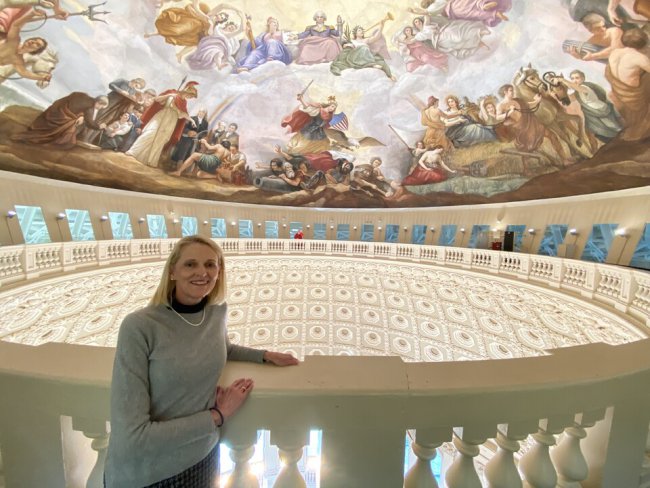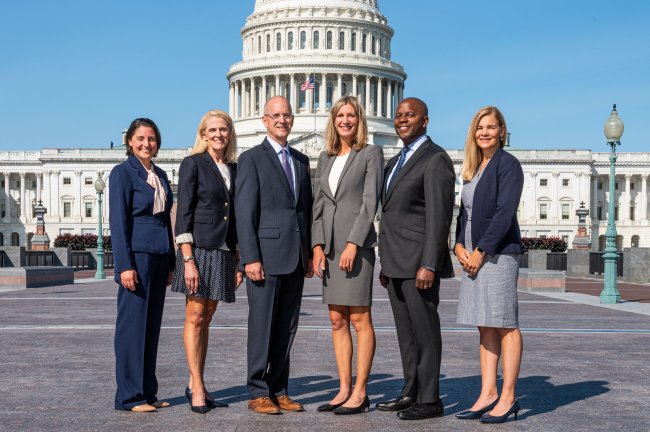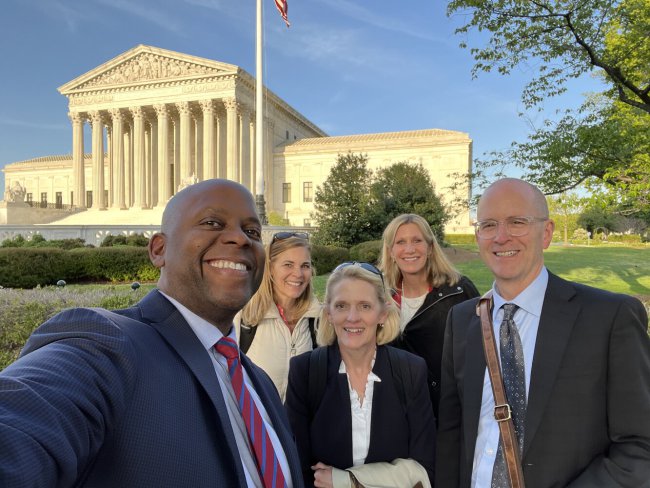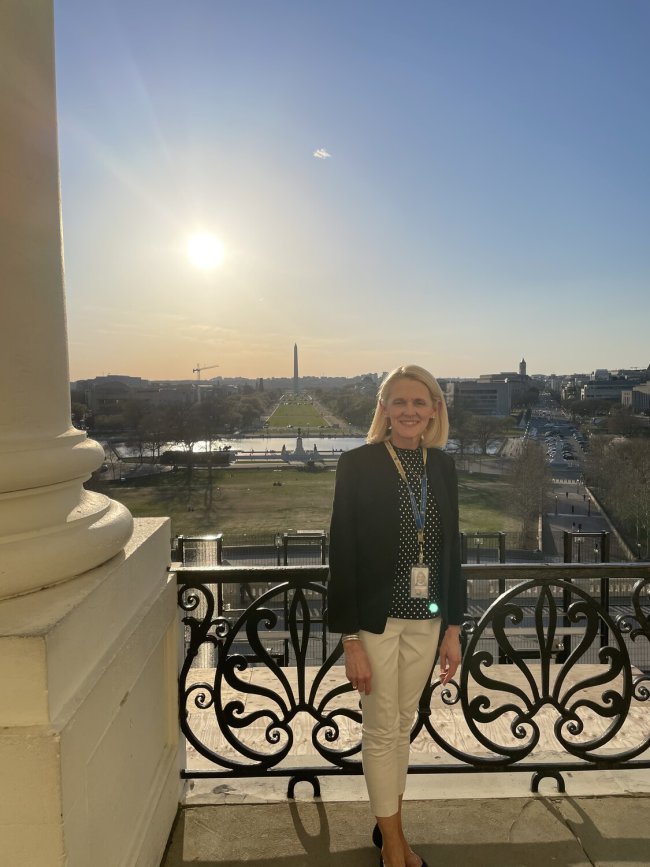From Bedside to Beltway: A Nurse’s Journey into Health Care Policy

Brenda Baker stands under the dome inside the U.S. Capitol. Photo courtesy Brenda Baker
Nurse and professor Dr. Brenda Baker says nurses should have a “bigger footprint” in the health policy arena—the RWJF Health Policy Fellows program helped her see how big a difference she could make
By Jamie Durana
Four-year-old Brenda Baker stood on her tiptoes and peered through the window into the hospital nursery. Baker’s mother was a nurse working the night shift and had taken the little girl and her older brother along with her to work. The kids had gone to bed, but Baker slipped out to see what was happening during the night shift. She watched as nurses wearing masks and gowns fed and cared for the babies in the nursery. “That’s what I’ll do when I grow up,” Baker thought. “I’ll take care of the babies!”
Baker’s childhood dream ultimately came to fruition—she entered nursing school and chose to go into the field of maternal-newborn health, starting out in the neonatal intensive care unit. When Baker did her maternity rotation in nursing school, she knew right away that it was the field for her: “I still remember the first baby I saw born,” she recalls. “I was hooked.” Now director of policy at the American Association of Colleges of Nursing, Baker’s career of more than 40 years gave her the opportunity to do just what she imagined when looking through that hospital nursery window. “There’s nothing in the whole world like watching a baby be born and being a part of that with a family,” Baker shares. “I always felt like it was a privilege to be there on that day.”
Throughout her career, Baker’s dedication to caring for her patients built in her an interest in improving health care policy from the hospital level on up. It’s that desire to create change that ultimately drew her to participating in the prestigious Washington, D.C.-based Robert Wood Johnson Foundation (RWJF) Health Policy Fellows program in 2021-2022, where she would gain experience in how policy is made at the national level.

The 2021-2022 class of RWJF Fellows outside the U.S. Capitol.
Early on in Baker’s career, she began to understand that she could use her position as a nurse to make real changes in people’s lives. She witnessed firsthand the impact stigma can have on the health care that patients receive or don’t receive, and how policies can be changed to improve patient outcomes. Baker found that stigma—whether around incarceration or substance use disorder—can stand in the way of people getting the health care they need.
After nursing school, Baker earned her PhD at Virginia Commonwealth University. She went on to work at the hospital in the university’s health system as a clinical nurse specialist in labor and delivery, an advanced position that allowed Baker to focus a great deal on staff development and project management. One day, a nurse came to Baker’s desk upset about something happening on the floor. Baker says the nurse was caring for a patient from the local jail who was about to give birth and “they had her handcuffed, they had her shackled to the bedrails.” Baker and the nurse went onto the floor to tell the officers to unshackle the patient but had no luck. Rules were rules. Not only was this unkind, Baker thought, but “it’s not safe”—after all, things can change at the drop of a hat in labor and delivery, and you never know if a patient will need to be moved or need additional care in another department. Baker leaned on the safety angle when she went to hospital leadership to make her case.
And they listened.
The next step was laying out the safety risks to the sheriff’s office to get this rule changed. Baker and her colleagues gathered their evidence and went to the sheriff. They were ready for a fight, but it didn’t come to that—the sheriff listened and changed the rule about shackling incarcerated patients giving birth.
It wasn’t too long before Baker went back to the sheriff’s office to try to overturn regulations that prevented new mothers from the local jail from breastfeeding. As before, she made her case, but, this time, she learned there was more work to do. The jail didn’t have a way to allow for new mothers to continue breastfeeding once they left the hospital. Baker and the hospital came up with a pumping plan so that the new mothers could provide breastmilk for their babies being taken care of by their families nearby. Baker was finding out that her experience and voice had power to make change happen, and she wasn’t done.
In 2015, Baker was working at Emory University and a student in the public health school was doing a project about pregnant women in the prison system. Baker volunteered to help develop a prenatal course for expectant mothers who were incarcerated. The program was a success and was picked up by the nursing school where it blossomed. Every Friday, on site in the prison, expectant mothers receive prenatal education. Baker says they developed a flexible curriculum to cater to what the students are seeking to learn and provide critical information for the expectant mothers. It’s also an important source of community for expectant mothers who will ultimately be separated from their newborns. Baker says the classes help them prepare for delivery and for what comes next. Baker has worked hard to make sure that joyful moments are captured for the students. In the class workbook she added pages “like the ones you might find in a baby book,” with prompts to help the students document their pregnancies. A small baby shower is held each month during the course, offering an opportunity for the students to receive gift bags of toiletries they might not be able to afford to buy from the prison commissary. By 2022, around 450 people had taken the course.
Baker’s interest in how policy at all levels intersects with people’s health and well-being was growing, together with her teaching career. And it was the same issue Baker had taken to the sheriff’s office in West Virginia years before that she would now take to the statehouse in Georgia. Many U.S. states allow shackling incarcerated women who are giving birth. Baker says it’s a common practice and one that she was eager to see change in Georgia. In 2019, Baker and a group of other volunteers came together to push forward legislation to make shackling illegal. The bill passed in the state and Baker was elated. Her dedication to championing policy that helps people was making a difference. It was an “‘oh my gosh, you can fix things’ moment for me,” she says. The success would be a turning point in placing her on the path to the RWJF Health Policy Fellows program.
Although Baker had a growing interest in health care policymaking, it was a nudge from Emory’s dean of nursing, Linda McCauley, that prompted her to take the next step. During a review one year, McCauley encouraged Baker to consider applying for the RWJF Health Policy Fellows program; after all she’d worked on legislation and had a clear interest. But Baker wasn’t so sure. She’d heard about the program but thought that it was “not something [she] could accomplish.” Yet McCauley’s suggestion inspired Baker to start working on an application and, as she started filling it out, she became certain that she needed to be part of the program. Baker knew from her experiences working toward policy change in Virginia and Georgia that legislation has a direct effect on health and well-being.
“It is so valuable in that you have insight, exposure, and contacts [through the fellowship orientation] that other people have to figure out after they get here.”
Baker earned a place in the fellowship and a placement in Senator Bill Cassidy’s (R–LA) office. Baker felt it was a perfect fit: it was “an amazing office to be in,” she says, with a talented health team and the opportunity to work on a range of impactful legislative priorities—including advancing youth mental health care and preventing stillbirths by increasing access to prenatal care. Baker says being part of the bustling Senate offices was a highlight of her fellowship, offering the chance to meet a wide range of people and to participate in constituent meetings.
Baker emphasizes that the three-and-a-half-month fellowship orientation made her feel well-prepared despite being in somewhat unfamiliar territory on Capitol Hill. “It is so valuable in that you have insight, exposure, and contacts that other people have to figure out after they get here,” she says. The orientation also gave her a chance to meet with pillars of the health care field, like Donald Berwick, former President and Chief Executive Officer of the Institute for Healthcare Improvement, whose work on safety and quality in health care Baker had long admired.
Among the many “phenomenal” people Baker met through the fellowship were the other members of her cohort. The group of six fellows were close-knit, with three living right in the same D.C.-area apartment building. Baker says the fellows’ varied interests and expertise made the group even stronger. “We each brought something unique to the collective knowledge and we learned from each other,” she said. Beyond being great colleagues who can bounce ideas around together, Baker shared that the group built lasting friendships. She remarks that they’ll “call on each other forever.”

Members of the 2021-2022 class of RWJF Fellows outside of the U.S. Supreme Court. Photo courtesy Brenda Baker
Baker’s fellowship experience showed her that the policymaking process can benefit from nurses’ experiences and perspectives. She shares that nurses have knowledge from the bedside about “what things really mean and what really matters” to patients. Baker says that nurses should have a “bigger footprint” when it comes to making health care policy. She encourages her students to learn about and understand how policymaking affects health care—and reminds them that changing policy is a marathon, not a sprint. “You can’t give up if it doesn’t work one year,” she tells them, some of this work is about being unrelenting. Most nursing programs have a health policy class, but Baker says they can be dry and, frankly, boring. She says the fellowship gave her new ideas for how to approach teaching health policy now and how to emphasize to students that “your voice really matters.”
“I can’t go back and be the same person I was before I did this because I know how you can make things different and improve things.”
As a nursing professor, Baker is passionate about teaching her students to have empathy for their patients’ lived experiences. Baker learned from growing up in small-town Virginia how important trust is in helping patients get the care they need. The town’s residents often came to see her mother for routine health care, like blood pressure checks and allergy shots. “It was sort of like living in a doctor’s office,” Baker recalls. The residents trusted their local nurse, and Baker appreciates how precious that trust is to this day. Throughout her career, Baker has seen time and again how stigma can be a barrier and one thing Baker hopes her students take away from her is how important it is to overcome the stereotypes and negative beliefs attached to certain health conditions and experiences. For example, she says that substance use disorder must be recognized as a chronic health condition, but that stigma is a roadblock. “The stigma and shame we assign to people with substance abuse histories, we have to let go of that,” she says. “We don’t know their stories.”

Baker stands on a balcony overlooking the U.S. Capitol grounds. Photo courtesy Brenda Baker
Baker’s advice for anyone on the fence about applying for the fellowship is to “just do it” and to not be afraid to ask questions. That’s just what Baker did when she decided to apply. She searched the fellowship alumni directory and found Sharron Crowder, an Emory alum, and emailed her for advice. Baker says Crowder gave her the encouragement she needed and even a mock interview to help prepare. Making that connection with someone who had already been through the fellowship was an important step for Baker and she encourages future applicants to “find people who have been fellows and ask questions.”
The fellowship is often described as transformative, and that’s just how Baker sums up her experience. “I can’t go back and be the same person I was before I did this because I know how you can make things different and improve things,” Baker says in explaining the influence the fellowship had on her. She likes to think of the fellowship experience as a “gift” and feels compelled to build on all that it instilled in her about making policy change that has a real and positive impact on health and well-being: “It is a mission that I will continue.”
Learn more about RWJF Health Policy Fellows by following us on LinkedIn! For more information about the upcoming fellowship application, visit our website. We appreciate your support in building a strong and diverse network leaders and maintaining a workforce skilled in health policy. Email info@healthpolicyfellows.org for questions about program opportunities.
